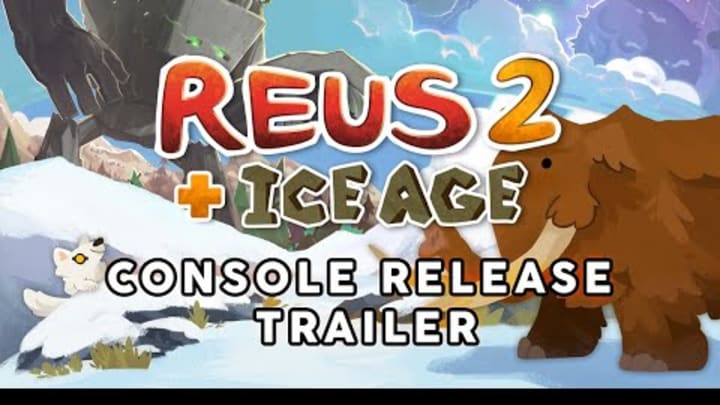I think we've all experienced to some degree or another wanting to get into a genre of game only to play it and either have a difficult time with it, not reach your expectations, or grow frustrated due to poorly explained rules or features that are usually explained best in 30-minute-long YouTube essays. For me, it's civilization-centric games: city-builders that focus heavily on strategy and resource management. I love all these subgenres in different titles; that isn't the issue. Together, it's harder for me to make sense of it. A personal example, I had bought Sid Meier's Civilization VI around the time of release. I saw friends having fun with the game and wanted to finally give it a chance, but I struggled with its tutorial and setups. I couldn't tell if I was actually making good progress or how far I had gotten. Not faulting the game, of course. Civilization is popular for a reason, and I enjoy watching it, but playing is a different experience altogether.
I played Reus 2 recently, hopefully to try and break this curse of mine. After several hours, I can safely say this is a great introduction to the genre, with plenty to explore and experiment with as you build city after city, empire after empire.
Following the formula of the first game, Reus 2 is a god game, seeing you take control of different elemental Gods as they bring different planets to life. They, and by proxy you, do this by terraforming the terrain and placing Biotica, usually in the form of various animals, plants, and minerals, each with its own unique resource, such as food or science. Collecting these resources allows you to accomplish different quests and progress through various eras in your planet's existence. Unfortunately, I have not played the first game, so I can't speak to its effectiveness as a sequel, but it is very easy to both get lost in and be lost on what to do in Reus 2.
You get a generous level of control in the setup, allowing you to play at your own pace by selecting your gods and first city leader to get you started, as well as changing difficulty and different eras. You can unlock everything available in your profile if you wish to jump ahead, and there's even a sandbox mode, letting you create a planet with little to no strings attached or just to use as practice. Each planet also gets a certain amount of Eon. Unlike other games where you have a limited list of actions you can take per turn, Eon is a currency; you can use it to place Biotica on your planet to help your cities progress.
The different Gods each have their own biome, and they prove to be an interesting challenge, each having its own Biotica with different benefits and drawbacks. All planets seem to be roughly the same, limited size, forcing you to approach each planet like its own puzzle box. Your cities can expand their territory, gaining benefits from Biotica outside their reach, and can also attack your other cities for resources. It makes the strategy aspect of the game more satisfying, forcing you to plan and adapt to their needs and wants by maximizing your resource output. You can do this by placing certain Biotica next to each other to unlock bonuses or using Draft Tokens to unlock better and more powerful Biotica for each biome.
However, Reus 2 does seem to follow the unfortunate pattern of city-builders having a fairly surface-level tutorial despite its in-depth mechanics. I found myself confused and sometimes frustrated because I misunderstood some mechanics or misused my limited space, making it incredibly difficult to progress my cities any further and, in rare cases, feeling like I had softlocked myself, forcing me to restart. It's such a disappointing snag considering that Reus 2 is a game that makes strategic city-builders feel much easier to play due to its difficulty scaling, unlockable permanents that give the game an interesting rougelite twist, and clear and concise instructions. This is not an isolated issue, however. Other games in this genre, like Civilization or Cities: Skylines, tend to fall into one of two camps: lengthy tutorials that have too many details to process and remember all at once, or surface-level explanations that leave out key details. At least, this is my experience with the genre. For all I know, I just need to follow the age-old Dark Souls advice of "getting good."
But, in a twisted way, I kinda appreciate that difficulty. It makes me more determined to learn everything I can, allowing me to build the best empires possible. Reus 2 is also easier to digest than most, with a more streamlined setup and an active online community to help explain beginner details and showcase the best of what this game has to offer. The developers are also nothing if not dedicated. Not only did they release their newest update for the game, but the publishers, Firesquid, have a section on their website dedicated to explaining the game's premise, news about updates and new additions, and available DLC, further stoking the flames. So, yes, while the game does have some drawbacks, there are easy ways around them.
Despite its shortcomings, Reus 2 is a great entry into the genre and absolutely worth your time. This article seems like I'm giving the genre of city-building and strategy a lot of flak, but truth be told, they're some of my favorites. They're a great way to unwind and can prove to be hours of fun, but I understand that this genre isn't for everyone. If you're willing to give it a chance, I cannot recommend Reus 2 enough. With its beginner-friendly introduction, bright and pleasant graphics, and welcoming community, you'll be thankful to have picked it up. It did just get a new update this past September, as well as a console port! So, why wait?
